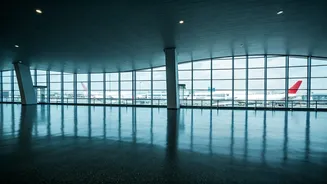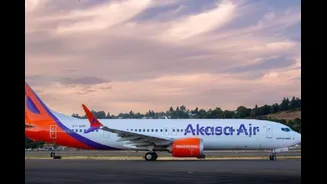Understanding the Changes
The travel industry in the United States is always responding to events. These changes can affect everything from flight prices to tourist hotspots. For
example, economic factors, like inflation or a recession, can make travel more expensive. Political decisions, such as new travel restrictions, can change the ease of visiting certain places. Also, social trends, like increased interest in eco-tourism, are shaping what travelers want. Staying informed about these issues helps travelers prepare for their trips, choose destinations wisely, and adjust their plans if necessary. It ensures visitors can enjoy their trips by understanding what is happening and being prepared for potential changes.
Economic Factors' Impact
Economic factors significantly influence travel decisions. Inflation, for instance, raises the cost of flights, hotels, and dining, forcing travelers to adjust their budgets. A recession can further limit spending, leading to shorter trips or a preference for budget-friendly activities and destinations. Conversely, economic growth can boost travel, as people have more disposable income to spend on experiences and luxuries. Changes in currency exchange rates can also affect travel plans. A strong dollar can make US travel more attractive for international visitors. In contrast, a weaker dollar may encourage more domestic tourism within the United States. Furthermore, fluctuations in fuel prices directly influence airfare, affecting travel costs for individuals. These factors showcase how economics play a vital role in shaping travel preferences.
Political Decisions' Influence
Political decisions heavily shape the landscape of travel. New regulations, travel advisories, and visa policies impact where people can go and how easily they can access those destinations. Changes in relations between countries can cause travel restrictions or make it difficult to obtain visas. Government investments in infrastructure, such as airports and roads, can improve access to tourist locations and change the appeal of destinations. Political instability, conflicts, or social unrest in a region can also lead to travel warnings. These actions influence traveler decisions and the demand for certain travel options. Policies promoting tourism, such as tax incentives for hotels or marketing campaigns, can increase interest in a destination. These decisions reflect how governments play a key role in the success of the travel industry.
Social Trends' Influence
Social trends significantly influence travel preferences and behaviors. The growing emphasis on eco-tourism and sustainable travel has boosted the demand for environmentally friendly accommodations, tours, and activities. The rise of social media has changed how people discover and share travel experiences, influencing the popularity of destinations and activities. Wellness travel, including health retreats and fitness programs, is becoming more prominent. Travelers are seeking experiences that contribute to their well-being. Furthermore, the interest in local culture and authentic experiences has grown. Travelers seek to immerse themselves in local traditions and communities, rather than just visiting famous landmarks. These trends reflect changing priorities of travelers, as they want to have meaningful and personalized travel experiences.
Planning for the Future
Anticipating future changes requires awareness of current economic, political, and social dynamics. Travelers should stay informed about economic trends to budget their trips appropriately. Tracking currency exchange rates, fuel prices, and other economic indicators helps in planning the trip cost. Staying updated on political situations and government policies will allow travelers to manage potential travel disruptions or restrictions. Consulting travel advisories and information from reliable sources is essential. Considering social trends, such as interest in sustainability, allows travelers to make responsible travel choices. Choosing eco-friendly accommodations and supporting local communities can enhance a trip. Flexibility is essential when travel plans can change. Being adaptable allows travelers to make the most of their trips, even when encountering unexpected obstacles.
















